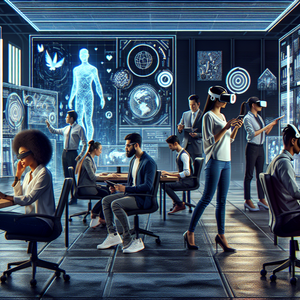The Hybrid Future of Justice Professionals: Redefining Roles in the Age of AI

AI is already making inroads into the justice system, demonstrating its ability to handle data-heavy tasks that were once time-consuming for human professionals. Predictive algorithms, for example, are used to estimate recidivism rates and identify individuals at higher risk of reoffending. Courts are experimenting with AI-assisted sentencing tools, and law enforcement agencies use data analytics for crime prevention. However, the integration of AI into probation and correctional treatment services introduces a new layer of complexity, as these fields involve rehabilitation, emotional support, and the reintegration of individuals into society. The question is not whether AI will play a role in the justice system—it already does. The real challenge is determining how to leverage this technology while preserving the human-centered aspects of justice that are vital for effective rehabilitation. A hybrid model, where AI complements human professionals, addresses this challenge by redefining roles and responsibilities.
Redefining Roles: Humans and AI as Complementary Partners
In a hybrid future, AI would serve as a powerful assistant, handling repetitive and data-driven tasks, while human professionals focus on tasks requiring emotional intelligence, ethical judgment, and personal connection. Probation officers and correctional treatment specialists are often overburdened with administrative duties, leaving them with limited time to engage meaningfully with their clients. AI can alleviate this burden, enabling justice professionals to concentrate on building relationships and crafting personalized rehabilitation plans. For example, in risk assessment, AI can analyze vast datasets—including criminal history, socioeconomic background, and even real-time behavioral data—to provide a more comprehensive risk profile. However, the human role remains indispensable. A probation officer can interpret the AI's findings within the context of an individual's life story, considering factors such as progress in therapy, family dynamics, or the presence of a support network. This collaborative approach ensures that decisions are informed by data but guided by empathy and ethical reasoning.
The Emotional and Psychological Edge of Human Professionals
While AI excels at processing data and identifying patterns, it cannot replicate the human qualities essential for rehabilitation: empathy, cultural sensitivity, and the ability to build trust. Justice professionals often serve as mentors, advocates, and counselors for individuals navigating the challenging road to societal reintegration. These roles require not just technical knowledge but also emotional intelligence and moral reasoning. For example, an AI system might flag missed appointments or risky behaviors as indicators of potential relapse. While this information is valuable, it takes a human professional to dig deeper, uncovering underlying causes such as trauma, poverty, or a lack of social support. The officer can then intervene with tailored solutions, such as connecting the individual to addiction counseling, job training programs, or community support groups. By combining technological efficiency with human compassion, the hybrid model ensures that interventions are not only effective but also humane.
Ethical Considerations: Balancing Efficiency and Fairness
The integration of AI into the justice system raises ethical concerns, particularly regarding the potential for algorithmic bias and the dehumanization of decision-making processes. Algorithms are only as objective as the data they are trained on, and historical biases in the justice system—such as racial or socioeconomic disparities—can inadvertently be perpetuated by AI systems. A hybrid model addresses these concerns by ensuring that human professionals remain central to the decision-making process. For example, if an AI system recommends stricter monitoring for an individual based on historical data, a probation officer can contextualize this recommendation, considering factors such as recent progress, personal circumstances, or mitigating factors. This collaborative approach mitigates the risk of over-reliance on algorithms and ensures that justice remains fair and individualized.
Preparing for the Hybrid Future: New Skills and Training
To thrive in this hybrid future, justice professionals will need to adapt to new technologies and acquire skills in data interpretation and AI collaboration. Training programs for probation officers and correctional treatment specialists must evolve to include education on AI tools, ethical considerations, and the integration of technology into case management. For example, courses on machine learning basics and algorithmic bias could help justice professionals understand the strengths and limitations of AI systems. Additionally, organizations must invest in user-friendly AI platforms and provide ongoing support to ensure that employees can use these tools effectively. Beyond technical training, fostering a culture that values both innovation and human insight is essential. Justice organizations must encourage open dialogue about the challenges and opportunities of AI integration, ensuring that professionals feel empowered rather than threatened by technological change.
The hybrid future of justice professionals represents an exciting vision of what rehabilitation could look like in the age of AI. By combining the analytical power of technology with the empathy and moral reasoning of human professionals, this model has the potential to create a justice system that is both more efficient and more compassionate. As we embrace this transformation, it is crucial to remember that technology is a tool, not a replacement. The ultimate goal is to empower human professionals, enabling them to focus on the aspects of their work that matter most: building trust, fostering change, and guiding individuals toward brighter futures. By striking the right balance between AI and human insight, we can create a justice system that not only serves society more effectively but also upholds the dignity and humanity of every individual it touches.
AI Ethics Specialist in Justice Systems
Government agencies, non-profits focused on criminal justice reform, and private AI ethics consulting firms
Responsibilities
Develop and implement ethical guidelines for AI tools used in probation, risk assessment, and sentencing.
Audit AI algorithms to identify and mitigate bias, ensuring fairness and equity in decision-making processes.
Collaborate with justice professionals to align AI insights with human-centered practices and ethical considerations.
Required Skills
Expertise in algorithmic fairness, machine learning ethics, and human rights law.
Strong understanding of justice system operations and challenges, especially regarding marginalized populations.
Communication skills to bridge the gap between technical teams and justice professionals.
Probation Officer with AI Integration Expertise
Local and state probation offices, corrections departments, and rehabilitation-focused organizations
Responsibilities
Use AI-based risk assessment tools to create tailored rehabilitation plans while interpreting data in the context of individual life stories.
Balance administrative tasks with human-centered responsibilities, such as mentoring and counseling clients.
Train colleagues on incorporating AI systems into daily workflows, ensuring ethical and effective use of technology.
Required Skills
Familiarity with AI platforms and basic data analytics.
Strong interpersonal skills for building trust and providing emotional support to clients.
Ability to contextualize AI-generated recommendations with real-world insights.
Criminal Justice Data Analyst
Research institutions, government justice departments, and private firms developing justice-related AI tools
Responsibilities
Analyze large datasets from AI tools to identify patterns in recidivism, resource allocation, or public safety trends.
Collaborate with probation officers and correctional treatment specialists to translate data insights into actionable strategies.
Evaluate AI tools' effectiveness by measuring outcomes, addressing potential biases, and suggesting improvements.
Required Skills
Proficiency in data analysis tools (e.g., Python, R, SQL) and AI technologies relevant to justice applications.
Knowledge of criminal justice policies and societal challenges, including racial and socioeconomic disparities.
Strong problem-solving and critical-thinking abilities.
Correctional Treatment Specialist with AI-Enhanced Case Management
Correctional facilities, community-based reentry programs, and government agencies focused on rehabilitation
Responsibilities
Implement AI-assisted case management tools to monitor client progress and identify early warning signs of relapse or risk factors.
Develop personalized rehabilitation plans by integrating AI insights with deep human understanding of client needs.
Facilitate access to community resources (e.g., addiction counseling, job training) based on AI-supported recommendations.
Required Skills
Knowledge of AI tools for tracking behavioral trends and predicting client outcomes.
Experience in counseling, rehabilitation planning, and community engagement.
Emotional intelligence and cultural competence to address diverse client backgrounds.
AI Trainer for Justice Professionals
Training and development firms, government agencies, or tech companies offering AI solutions for justice applications
Responsibilities
Design and deliver training programs to probation officers, correctional specialists, and other justice professionals on using AI tools effectively.
Simplify complex AI concepts, helping non-technical professionals understand the strengths, limitations, and ethical considerations of the technology.
Develop case studies and simulations to demonstrate real-world applications of AI in justice settings.
Required Skills
Expertise in AI and machine learning, particularly in tools used within the justice system (e.g., predictive algorithms, risk assessment platforms).
Strong instructional design and teaching skills, with the ability to tailor content for diverse audiences.
Understanding of justice system workflows and the human impact of AI recommendations.


